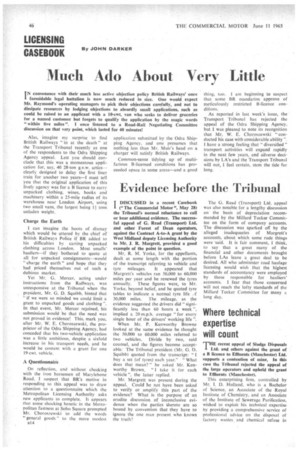LICENSING
Page 48

If you've noticed an error in this article please click here to report it so we can fix it.
CASEBOOK By JOHN DARKER
Much Ado About Very Little
TN consonance with their much less active objection policy British Railways' once I formidable legal battalion is now much reduced in size. One would expect Mr. Raymond's operating managers to pick their objections carefully, and not to dissipate resources by lodging objections to absurdly small applications, such as could be raised to an applicant with a 10-cwt. van who seeks to deliver groceries for a named customer but forgets to qualify the application by the magic words "within five miles". I once listened to a Road-Rail Negotiating Committee discussion on that very point, which lasted for 40 minutes!
Alas, imagine my surprise to find British Railways "in at the death" at the Transport Tribunal recently as one of the respondents to the Odra Shipping Agency appeal. Lest you should conclude that this was a momentous application for, say, 40 28-ton g.v.w. artics-clearly designed to delay the first liner train for another two years—I must tell you that the original application of this lively agency was for a B licence to carry unpacked clothing, wines, books and machinery within a 25-mile radius of its warehouse near London Airport, using two small vans, the largest being 11 tons unladen weight.
Charge the Earth
I can imagine the hoots of dismay which would be uttered by the chief of British Railways Police if BR added to his difficulties by carting unpacked clothing across London. Most smalls' hauliers—if they bothered to quote at all for unpacked consignments—would "charge the earth" and hope that they had priced themselves out of such a dubious market.
Yet Mr. G. Mercer, acting under instructions from the Railways, was unresponsive at the Tribunal when the president, Mr. G. D. Squibb, hinted that if we were so minded we could limit a grant to unpacked goods and clothing ". In that event, Mr. Mercer rejoined, his submission would be that the need was not proved in evidence! This, mark you, after Mr. W. E. Choroszewski, the proprietor of the Odra Shipping Agency, had conceded that his two-vehicle application was a little ambitious, despite a sixfold increase in his transport needs, and he would be content with a grant for one 19-cwt. vehicle.
A Questionnaire
On reflection, and without checking with the iron horsemen of Marylebone Road, I suspect that BR's motive in responding to this appeal was to draw attention to a questionnaire which the Metropolitan Licensing Authority asks new applicants to complete. It appears that some shocking heretic in the Metropolitan fastness at Soho Square prompted Mr. Choroszewski to add the words "general goods" to the more modest
a14
application submitted by the Odra Shipping Agency, and one presumes that nothing less than Mr. Muir's head on a charger will satisfy British Railways.
Common-sense tidying up of multifarious B-licensed conditions has proceeded apace in some areas—and a good thing, too. I am beginning to suspect that some BR mandarins approve of meticulously restricted B-licence conditions.
As reported in last week's issue, the Transport Tribunal has rejected the appeal of the Odra Shipping Agency. but I was pleased to note its recognition that Mr. W. E. Choroszewski "conducted his case with considerable ability ". I have a strong feeling that "diversified " transport activities will expand rapidly in the next few years, and aldverse decisions by LA's and the Transport Tribunal will not, I feel certain, stern the tide for long.




























































































































